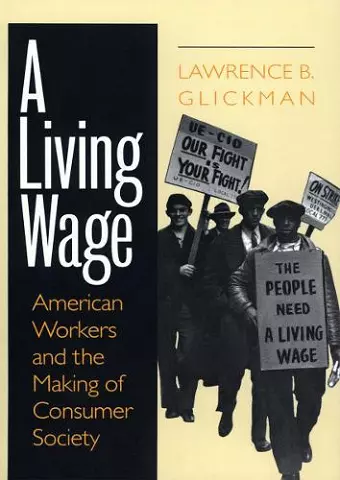A Living Wage
American Workers and the Making of Consumer Society
Format:Paperback
Publisher:Cornell University Press
Published:9th Mar '99
Currently unavailable, and unfortunately no date known when it will be back

The fight for a "living wage" has a long and revealing history as documented here by Lawrence B. Glickman. The labor movement's response to wages shows how American workers negotiated the transition from artisan to consumer, opening up new political possibilities for organized workers and creating contradictions that continue to haunt the labor movement today.Nineteenth-century workers hoped to become self-employed artisans, rather than permanent "wage slaves." After the Civil War, however, unions redefined working-class identity in consumerist terms, and demanded a wage that would reward workers commensurate with their needs as consumers. This consumerist turn in labor ideology also led workers to struggle for shorter hours and union labels.First articulated in the 1870s, the demand for a living wage was voiced increasingly by labor leaders and reformers at the turn of the century. Glickman explores the racial, ethnic, and gender implications, as white male workers defined themselves in contrast to African Americans, women, Asians, and recent European immigrants. He shows how a historical perspective on the concept of a living wage can inform our understanding of current controversies.
A Living Wage is an important book that challenges the view of pure and simple unionism as apolitical. It also calls into question where, when, and why Americans first embraced a consumer identity.... A fascinating study of the rise of a consumer-oriented working-class ideology.
* Journal of American History *A very fine, well-written study of changes in rhetoric and ideology, as well as a lucid discussion of what these changes tell us about the goals of working-class leaders, thinkers, and reformers. Glickman's study is less about wage labor and consumption than about changing notions of and perspectives on these issues. As such, A Living Wage is a valuable contribution to the history of working-class culture, rhetoric, and ideology in the late nineteenth and early twentieth centuries.
* Industrial and Labor Relations Review *Glickman makes a bold contribution to the wider task of rethinking the late nineteenth-century labour movement, and his findings deserve wide notice.
* Labour History Review *Glickman provides an entirely new way of understanding working-class material demands.
* Reviews in American History *Glickman's lively and thoughtful intellectual history of the concept of a living wage speaks both to historians of American working people and to historians of Amercan culture.... His primary method is discourse analysis, and he does it very well.... He writes clearly and evocatively, with sensitivity to gender and race, as well as class.
* Journal of Social HistoISBN: 9780801486142
Dimensions: 229mm x 152mm x 18mm
Weight: 454g
240 pages